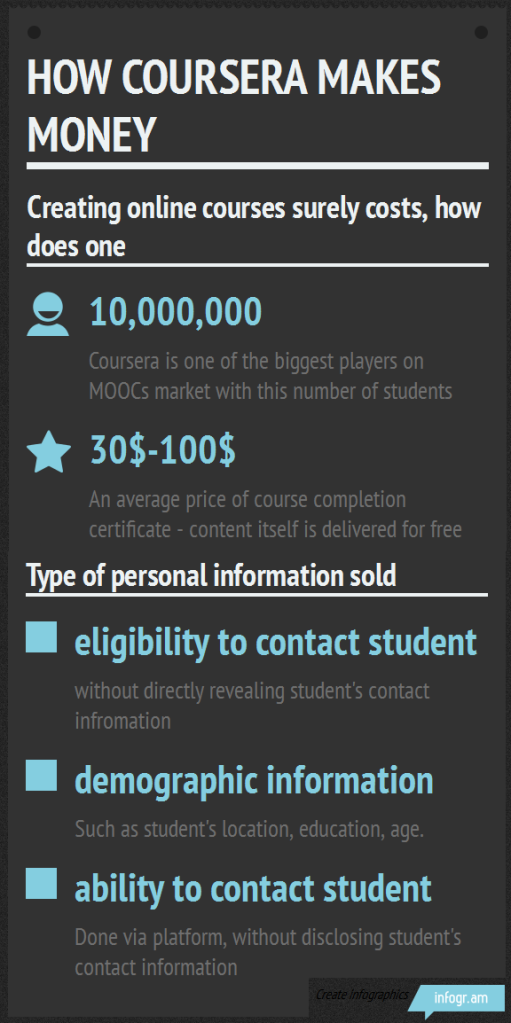How MOOC platforms use our data
The biggest disruption made by technology in education in recent years has been the invention of Massive Online Open Courses (MOOCs) [1]. They consists of a series of videos, additional reading and accompanying exercises delivered via the Internet for free.The opportunity to take such courses, lectured by world-class researchers from best universities in the world, has been seized by millions of people.
Creation of such online module costs. Some platforms are run as non-profits by universities directly (like edX.org by MIT and Harvard). However, other websites (Coursera, Udacity) are registered as for-profit companies. How do they make money?
MOOC platforms gather a lot of information about their users [2]. This is possible as taking part in a course demands registering on a website, which proceeds to collect all possible data on a student, such as his IP, participation in discussions, time spent doing exercises. Primary objective of this process is to be able to reflect on student’s behaviour and experience in order to improve the delivery of knowledge.
However, few students are aware that some of these information is sold to third-party companies [3,4]. Firms use it to recruit the best students or use it simply to screen job candidates.
This procedure links back to the debate we had on UOSM2008, in Topic 2 and Topic 3. Firstly, the ability of a prospective employee to screen a person’s behaviour on online courses may hinder his job prospects. Effort put into creation of online professional profile may be thrown into the bin when a company finds information that puts us in bad light on our MOOC profile.
When created, online courses were described as a force helping to democratise education, by making courses from best universities and lecturers available for free to everyone in the world. This opportunity is appreciated for example by Bill and Melinda Gates Foundation:
However, the fact that some platforms use personal information to balance one’s cheque books is a questionable attitude. This procedure makes the courses no longer free: users pay with their own data, raising privacy concerns. On the other hand, it still is a much lower price than attending MIT, with fees around 58,000$ per year. Also, it has to be mentioned that many of online courses platforms decided not to use user’s data for advertisement purposes.
To sum up, I still see much more added value in participating in Coursera modules, but one needs to be aware of all costs associated.
Resources:
[1] Online education run amok?, Politico, 29/11/14
[2] Coursera Online Course Hosting and Services Agreement
[3] Massive open online courses: Fee opportunities, Wikipedia
[4] How are universities evolving and earning revenue from MOOCs?, The Pie News, 4/04/14
[5] Bill Gates: how online courses can radically improve education by 2030, the Verge, 11/02/15

